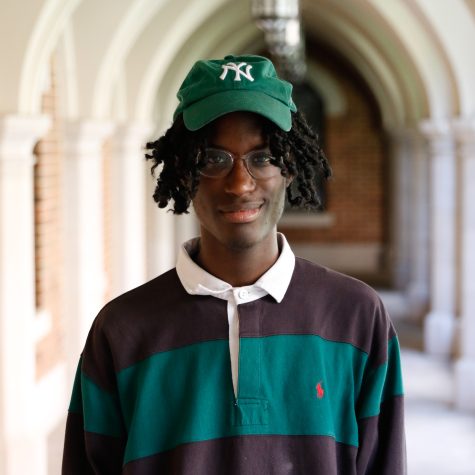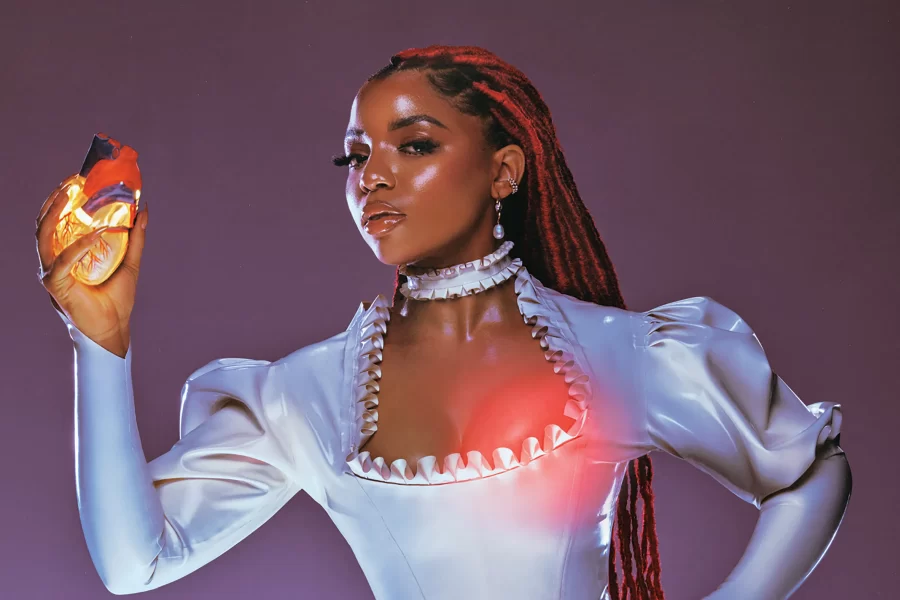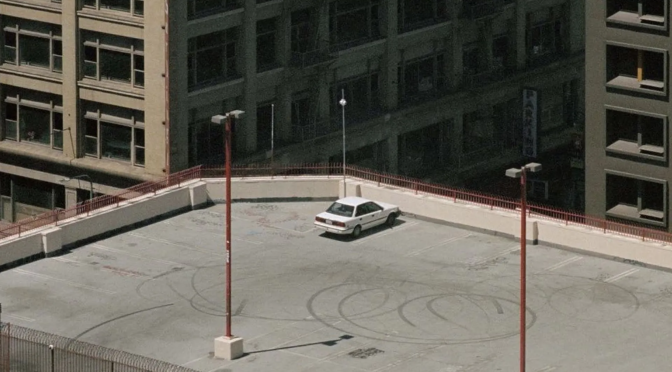Davonte Jolly’s 2018 skate clip “A DAY WITH THE HOMIES – THE RESURGENCE” features a tense verbal conflict over private property, where an angry Na-Kel Smith contentiously bickers with a snooty rich couple as the rest of his skateboarding crew resolves to take the high road. Cries of “Nak” and “Come on bro” populate the background while he gets into the pair’s grinning faces, and ever so gradually, the voices of his posse grow fainter and fainter. It becomes painfully clear that whatever happens, there is zero possible scenario where he comes out on top: he’s physically outnumbered; the only security guard present isn’t on his side; at any second, the cops can be called and his career—perhaps his life, too—can come to an abrupt end.
The situation evolves to a point where Smith is on one side of a glass barrier, and the couple, protected, is gleefully taunting him from the other.
“Why are you sweating?” the woman teases in a sing-songy voice, craning her neck around the structure. “No one else is sweating but you.”
“‘Cause I’m putting in that work, dumbass,” Smith shouts back. “You don’t understand this. Y’all don’t know nothing about life at all. Y’all gonna die. And I’m living my life.”
It’s a moment that, as brash and uncivil as it may look on camera, speaks to an admirably rare quality Smith has fostered over the course of his career: he lives fast—dangerously fast—but he’s living. Having built a name as a professional skater-turned-rapper over the past decade, he relishes in the temporality of the epic, high-flying spirits launching him over just as many fears as it does railings.
Recreational skateboarding somewhat requires some level of this fiery DNA, as its fundamental crux is a war against pissed off pedestrians and law enforcement; yet somehow, Na-Kel Smith manages to take an already-risque lifestyle and etch it several notches higher. If skating is standing at the cataract of a waterfall, he’s the dude leaning over the edge.
“When you’re skating, you can’t think about anything else … It don’t matter how much money you got in your pocket,” he said in a 2020 interview with model Paloma Elsesser. “It don’t matter about anything. It’s only about what you are doing at that moment in time.”
Timelessness is a sentiment Smith’s cult legend hinges on, and it’s one that, since the late 2010s, he has sonically expounded upon in a still-unfurling hip-hop venture. Under both his own name and the moniker “RACECAR STUNTMAN” (When I DMed him on Twitter about an interview, he responded “I’ll ask racecar”), he performs crudely fast-paced and high-pitched rap ballads that tread the line between mosh-pit and pulpit. Whether you’re watching Smith hardflip over a steep staircase or hearing his excessively highly-wrought voice demand you to “turn me up so they can hear me in heaven,” the ceiling no longer exists, and you’re left wondering why you ever respected its power in the first place.
Though Smith grew up within the folds of the now-defunct Odd Future rap collective, his own music has, over time, leaned further and further into a punk-adjacent quality far removed from the output of his LA peers. His first full-length album, 2019’s “Twothousand Nakteen,” sounded a lot like what you’d get if you enrolled a screamo metal vocalist into an intervention program then locked him in a studio with Zaytoven. The very first track sees him screaming loud enough to make your brain grow arms and plug your ears for you, but when you stop listening to the noise and start listening to the sentiment, it etches a permanent mark.
“Don’t give a fuck what type of hole I’m in, I plan to get out,” he yells, each individual rasp in his voice scratching violently at the skin on your ear. “Everybody goal out here to win, but who living it now? Make sure you run it up and fuck who talking you down.”
Any hole, you realize, can’t possibly be too deep for someone who observes no restrictions in the first place. You leave the song feeling like you’ve already won—and even if you haven’t, that you have more than enough fiery energy to very quickly do so.
Smith’s penultimate LP, this past year’s “A DREAM NO LONGER DEFERRED,” is a fitting encapsulation of his ethos by just the album cover alone—he’s seated on top of planet Earth in his own signature Adidas sneakers, lighting a joint as the faded images of Martin Luther King Jr. and Langston Hughes look on in the background. He seems to be asserting that he, too, belongs in this pantheon of larger-than-life Black voices; and it’s a sentiment bound to elicit angry claims of irreverence from older generations.
But it’s also a glorious snapshot of the power of projection—who says that a skateboarder can’t impact a generation like a Harlem Renaissance poet? If it isn’t made clear enough by the cover that Smith isn’t afraid to step into monumental shoes, the music well suffices in verbalizing the point. Just like everything else about Smith, from his skate tricks to his verses, it’s potent enough to stick with you long-term.
In hindsight, for a majority of the time I spent walking around campus last semester, I was mindlessly muttering a lyric from “A DREAM NO LONGER DEFERRED” under my breath: “think I’m playing, I’m serious kiddd” when I was amped up for a presentation, “only trust in the mirror, you dig” when said presentation didn’t go well, and “treat the 110 like the Autobahn, vroom” when I was rushing to office hours for a reconsideration of the presentation grade.
Smith’s latest LP “SKULLFACE BONEHEAD,” second in a line of forward-thinking RACECAR STUNTMAN projects, sees him do the exact same thing musically that he does on a skateboard—etch something that’s already crazy several notches higher on the scale. Even prior to this new era, Smith’s musicality carried with it the brazen nature that lashes out at rich couples and spits in the faces of their security guards. “SKULLFACE BONEHEAD,” though, feels as if he has injected this archetype an even more transformative medicinal concoction: the beats are wilder, the energy less human; if he was leaning over the cataract before, now he’s diving head-first down the waterfall.
On “HEAVENV3,” a booming high point on the record, Smith squawks shout-outs to Tyshawn Jones, love declarations to his haters, and well-placed Harry Potter references over a shuffling backbeat as ballistic as his balmiest tricks. Of all the grammatical and instrumental antics tightly packed into the track’s minute-long window, one bar pops out more prominently than the rest.
“I know you see how vicious we done did it to ‘em,” he says, seconds before a lightning-fast denouement. “Now we gotta deal with the mental struggles.”
The lyric is an equally grim and honest peephole into one of America’s most eccentric lifestyles. Any time that Na-Kel Smith argues with the elite, clears staircases in the wee hours of the morning, or lashes out to defend his crew against naysayers, the thought of whether or not he’s doing okay isn’t really in the question. His exploits are eye candy: we love to see the good guy win, and he’s the ultimate good guy.
On the more mental front, under his RACECAR STUNTMAN moniker, Smith is beginning to gradually tear down the curtain separating his sky-high mystique from his perhaps less ethereal reality.
“Sometimes I feel like all I know is trouble,” he laments over a sparkling jazz-adjacent instrumental on “THE PROBLEM.” “I get it from my mama and my father. I’m tired of dealing with the drama. Maybe I’m the motherfucking problem.”
He isn’t yelling on the track, and the sonic atmosphere is noticeably slowed down several paces. Smith’s outward-facing megaphone is converted to an inward-facing diary entry, one that serves as less of a private moment of weakness and more of an open letter to every other weak person listening. The same voice that taught us it was okay to be brash is teaching us that it’s also okay to be humble. Most of the time anyone sees Smith, he’s defying gravity—but when he comes down, he’s landing on the same common ground as everyone else.
Such a concept, as simple as it seems, is complicated by an even simpler one: hate.
“Why they do me like that?” he asks in the aforementioned Davonte Jolly video, flashing a weary version of his cheshire grin following the argument. “I hate people, bro. Why are you sweating? I’m doing something. I’m working out. I’m playing sports. Ooooh I just be hating people sometimes because they hate for no reason.”
Every single one of us spends some time on both sides of the coin: yes, we occasionally grow tired of people who hate for no reason. But, also yes, we are occasionally the ones hating for no reason. It’s a vicious cycle, and one that has lasted for the entire span of human history. Wars? Haters. Genocides? Haters. Conflicts? Haters. We are our own problem.
But Na-Kel Smith wants to change that. Whether he’s screaming it down your ears over bass-heavy backbeats, crooning it softly over somber jazz instrumentals, or embodying it in his hyper-aggressive skate clips, his entire philosophy is centered around both dealing with the problem—even if it’s a snooty old couple—and admitting that he is also a part of it.
Simply “changing” a dynamic that has plagued planet Earth since the genesis of mankind is no easy task. But for the same guy who lit a joint on top of the globe while Martin Luther King Jr. and Thurgood Marshall looked on, made actually not wearing Yeezys more of a flex than it ever has been, and let his spirits launch him over just as many staircases as inhibitions, it doesn’t seem too tall a command.
All it takes is nerve. And Na-Kel Smith has a lot of it.























